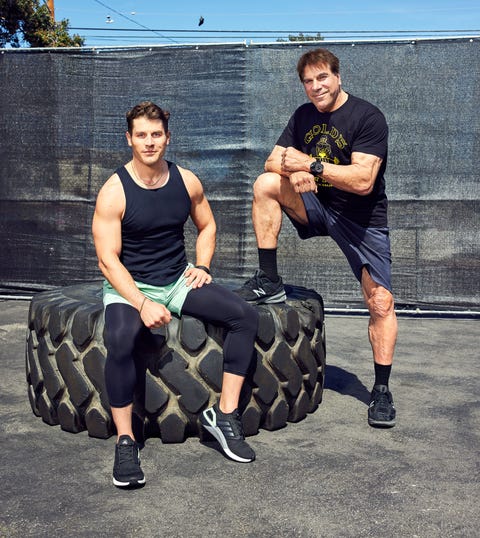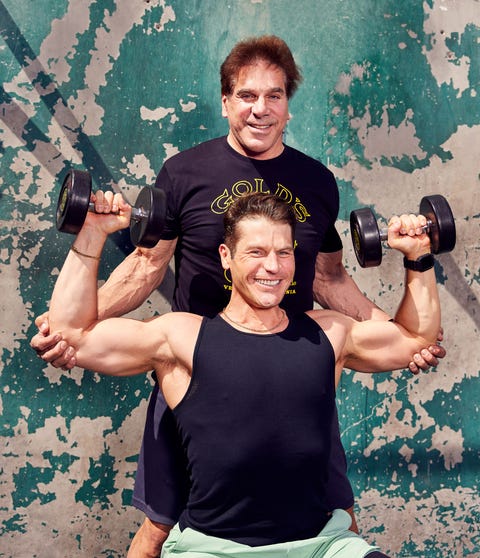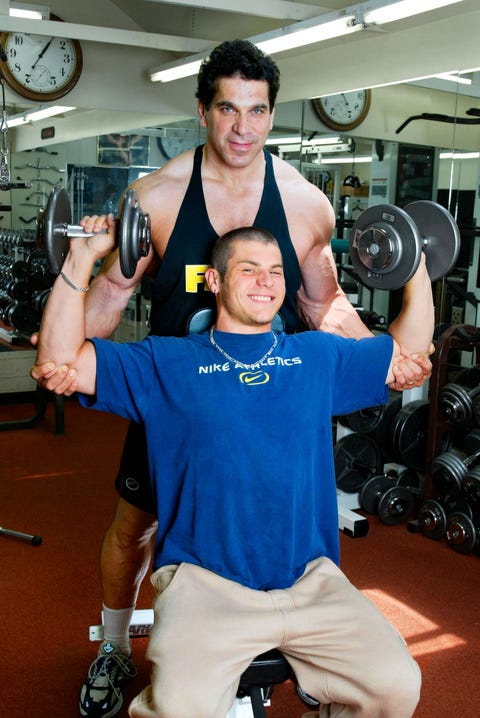Lou Ferrigno, 69, is a two-time Mr. Universe champion, a trainer, and an actor (he’s the OG Hulk). His son, Lou Ferrigno Jr., 36, is also a bodybuilder, a trainer, and an actor. (You can see Junior in four movies this year: Dreamcatcher, Final Frequency, Nightshade, and Blackout.) Here’s how each helped the other grow.
Men’s Health: How did each of you start training?
Lou Ferrigno: When I was young, I had the hearing issue and the speech impediment. My father was abusive, so I was obsessed with power. I would read the Hulk comic books, the Superman comics. I fantasized about being stronger than anybody else. I just loved strength.
Lou Ferrigno Jr.: I saw a guy in a Ren & Stimpy cartoon who had these big pecs. Girls on the beach loved the pecs. So when I was 11 or 12, I said, “Dad, I want to work out. I want pecs.” And who was I to turn to? Lou Ferrigno was my first training partner. Which is really cool.
LF: When you were young, you were kind of overweight. But I never pushed you to train.
LFJ: I wanted to make a change in my life. I didn’t want to be made fun of anymore.

MH: You got made fun of?
LFJ: One time, when I was about 11, our family was at the Fashion Café in New York City. My foot was in a cast [from a PE accident at school], and I was limping. This table full of teenagers started laughing. One of them got up and was limping, making fun of me. So we get to our table and my sister says, “Dad, these boys were making fun of Louie!” And he goes [switching to his father’s voice], “Where are they?” Dad gets up and he walks over to this table of, like, seven or eight kids and a father. And he goes, “Which one of you made fun of my son?” They all freeze. And he goes, “Don’t you ever make fun of my son again!”

LF: I wasn’t really angry. I just knew I had to say something. Some of them, I’m pretty sure, peed in their pants. I’d forget how big I was. I remember walking around the street, I had to wear a 4XL T-shirt. People would get out of the way. It was like Moses coming. When I’d get upset, people would think I was becoming the Hulk. But I don’t see myself like that. When you’re that big, you don’t see yourself being that big. I see myself as a regular guy.

MH: Has your relationship with physical fitness and parenting evolved?
LF: I wanted to give him my name because I felt like he was destined for great things. I didn’t want him to go into bodybuilding, because bodybuilding is a very difficult sport. I wanted him to have a college education, because he was very smart.
LFJ: There was definitely a time when I was like, “How am I going to live up to this?” He put this pressure on me, unjustly, because I didn’t choose any of this. His and my relationship wasn’t good. It took some time, and it took a lot of soul-search-ing, but I came to see him as a teammate and a coach, rather than the opposition. LF: My wife is a former psychotherapist. I decided to go into therapy because I didn’t want to be like my father. My father never had the ability to say he was wrong, he was sorry. . . . I didn’t want to be like him with my kids. That’s why I let my kids speak when they’re angry. Sometimes I heard things I didn’t want to hear. But I’d rather have them express.
MH: How did Lou Jr. become an actor?
LF: Louie can do things I can’t do. He had a different look. It all started when he saw me as the Hulk. [Lou Jr. was three when his father filmed The Incredible Hulk Returns.]
LFJ: That was one of my earliest memories. I thought I was just gonna see my dad. I knock on the motor home and he’s in full makeup. He looks at me, a giant green monster of a dude, and I start running down the beach, freaking out. What I remember next is holding his hand and walking to set. He said, “Stay here,” and walked off. I looked down, and I had green paint on my hand. That’s when it all started to piece together.
LF: Then I did a movie called Cage II [in 1994], and I gave Louie a small walk-on scene. He was very excited about that.
LFJ: That was the moment when I knew I was going to be an actor the rest of my life. It happened in a literal instant.
MH: Did you compete with each other?
LFJ: My dad is just a big guy. Big heart, big man, big hands, big altogether. I just didn’t match that. I just didn’t match that size in terms of bone structure, in terms of strength, in terms of anything physically. And he would remind me. He was the Incredible Hulk, the essence of masculinity dialed up to 11. There were a couple instances when I thought if I couldn’t have that, I’d have nothing. But then there came a point [after college at USC] when I was studying the craft of acting, digging deep into what building a character is, that I realized I can do a lot of different things. So why compare when I just have to carve my own path?
LF: I remember when you dieted really, really hard.
LFJ: That was when I was around 19 and I did an eight-week shred. The routine was grueling, and I was thinking about cheating, and my dad’s like, “Hey, you can do it. You can get there.” I remember I was cleaning dishes, right before the end, and my dad starts poking me. I’m like, “What?” And he’s like, “Isn’t it amazing how the body changes?” He’d never been too excited about what I was doing. But I was peeled; 4 percent body fat. He knocks on my door—and he never really comes to my door—and he has a Polaroid camera, and he says, “Can I take some photos of you?” So I flexed. I still have those photos.

MH: Lou Jr., did you ever feel you needed to pursue pure strength?
LFJ: I did. But when I started to plateau, I was training with guys that were my size that were 100, 200 pounds heavier than me on the bench. I wasn’t going to lift that kind of weight. So I came to grips with the fact that I’m not as strong as my Incredible Hulk father. Honestly, I don’t remember one time when he didn’t out-lift me. Arms, he was quadrupling my weight. Physically, in my life, there was always a higher power. I had to be humble because my father was bigger, stronger than anyone else. Nobody understands the sheer magnitude of his presence.
LF: Louie was never into how much he could bench. I used to bench 560. He was always more interested in [being] athletic. You were faster than me.
MH: You were both fitness trainers?
LFJ: Out of college, around 2007, I had to support myself while I worked on my acting. I had a few very, very wealthy, well-known people. But it’s not all it’s cracked up to be. Work ethic is built by doing things. Often a client knows they have to train, but they’re keeping
a bad attitude the whole time. I’m like, “I’m here to help you. Fitness is for your health.”
LF: Most of my clients listened to me because I told them, “I don’t want to waste your time. I don’t want to waste my time.” They were scared of me. One time I had a guy from the Marine Corps who said to me, “No matter how hard I train, I never get tired.” I said, “Really?” I made him do the leg press to failure. I had him do the leg extension to failure. And then squat to failure. After two sets, he went in the backyard and puked. He came back and said, “Sorry I ever made that remark.”
MH: But Lou, when you trained Lou Jr., you never pushed him hard, did you?
LF: No, because I know it’s got to come from him. I never wanted to force training.
LFJ: I’m eternally grateful for that, because if you push your kids too hard, they’ll want to go the other way. He always let me find it for myself, and find the questions, and ask them. He was always a sounding board and a source of great knowledge for any question I had.
A version of this story appeared in the June 2021 issue of Men’s Health with the title Hulk Smash The Rules of Parenting.
Source: Read Full Article
